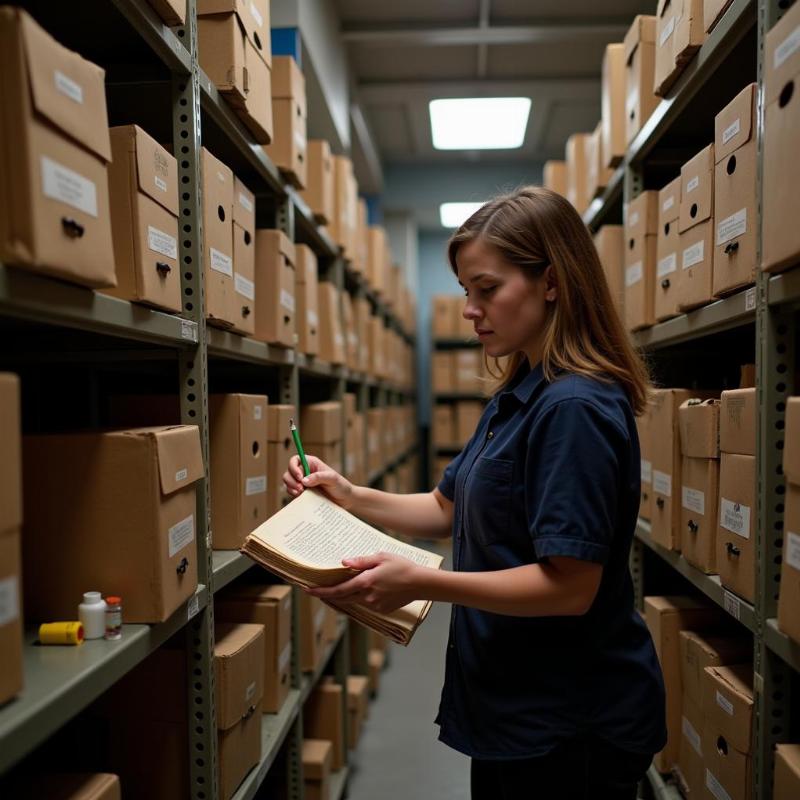The archives are places where are kept the records of our past, offering a glimpse into bygone eras and cultures. These repositories of history hold more than just dusty documents; they preserve the stories, struggles, and triumphs of humanity. Whether you’re a seasoned historian, a curious traveler, or simply looking to connect with your roots, exploring archives can be a rewarding and enriching experience.
Delving into the World of Archives
What comes to mind when you hear the phrase “the archives are places where are kept”? Perhaps images of dimly lit rooms filled with ancient scrolls and brittle parchments? While this may be true for some archives, the reality is far more diverse and fascinating. Archives house a wide variety of materials, from handwritten letters and photographs to government documents, maps, and even audio-visual recordings. They are dynamic spaces that actively collect, preserve, and make accessible the records of individuals, organizations, and governments. These records can provide valuable insights into historical events, social trends, and cultural shifts.
 Exploring Historical Archives
Exploring Historical Archives
Why Visit Archives? Unlocking the Past and Present
Archives are not just for academics; they are valuable resources for anyone interested in learning about the past. They can help us understand the present by providing context and perspective. For example, researching your family history in genealogical archives can reveal fascinating details about your ancestors’ lives and connect you to your heritage. archives are places where are kept documents related to your local community can shed light on its development and evolution over time. Even exploring archives related to your favorite hobbies or interests can provide a deeper understanding and appreciation for their history.
Where to Find Archives: A Global Perspective
Archives exist all over the world, from national institutions to small local repositories. Many countries have national archives that preserve historically significant government records. Universities and research institutions also maintain archives related to their specific fields of study. Local historical societies and libraries often house archives related to their communities. With the advent of digital technology, many archives are now making their collections available online, making them more accessible than ever before.
Navigating the Archives: Tips for Researchers and Explorers
If you’re planning a visit to an archive, it’s a good idea to do some research beforehand. Contact the archive in advance to learn about their hours, access policies, and any restrictions on research materials. Many archives require researchers to register and provide identification. When working with archival materials, it’s important to handle them with care. Avoid eating, drinking, or using pens near the documents. Take notes using a pencil or laptop. And don’t be afraid to ask the archivists for help! They are experts in their field and can provide valuable guidance and assistance.
Archives: More Than Just Storage
Archives are dynamic spaces where history comes alive. They are not simply places where records are stored, but rather places where knowledge is preserved, shared, and explored. From personal histories to national narratives, archives offer a window into the past and a pathway to understanding the present.
Conclusion
The archives are places where are kept the treasures of our collective memory. Whether you’re tracing your family tree, researching a historical event, or simply curious about the past, exploring archives can be a rewarding and enriching experience. So, delve into the world of archives and uncover the stories waiting to be discovered.
FAQ
- What is the difference between an archive and a library? While both institutions preserve information, libraries primarily collect published materials for general circulation, while archives collect unique, unpublished materials of enduring value.
- Can I access archival materials online? Many archives are digitizing their collections and making them available online. Check the archive’s website or contact them directly to inquire about online access.
- How can I donate materials to an archive? Contact the archive directly to inquire about their donation policies and procedures.
- Are there any fees associated with using archival materials? Some archives may charge fees for copying or accessing certain materials.
- What should I bring with me when visiting an archive? Bring a pencil, laptop, and any specific research questions or topics you are interested in exploring. Identification may also be required.
- How can I find archives near me? Online directories and search engines can help you locate archives in your area.
- Are archival materials fragile? Yes, many archival materials are delicate and require careful handling.
Plan your next adventure with PlaTovi! PlaTovi offers comprehensive travel services, from customized tour packages to hotel bookings and visa assistance. Whether you’re dreaming of exploring historical sites, immersing yourself in local cultures, or simply relaxing on a pristine beach, we can help you create the perfect travel experience. Contact us today at [email protected] or call us at +91 22-2517-3581 to start planning your next journey!